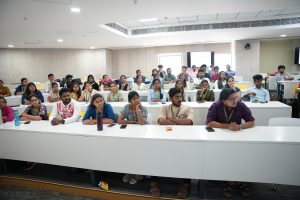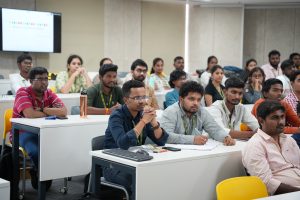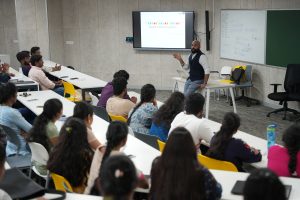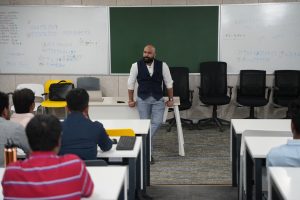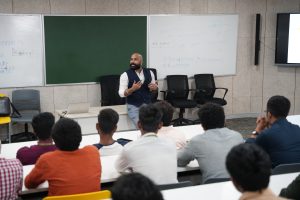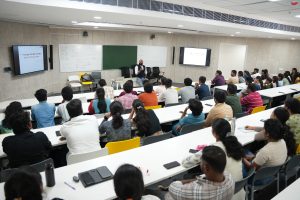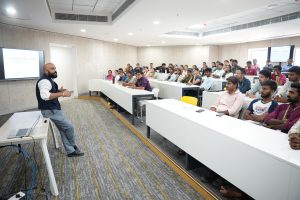Field Visit: Biological Sciences Students at AIIMS Mangalagiri
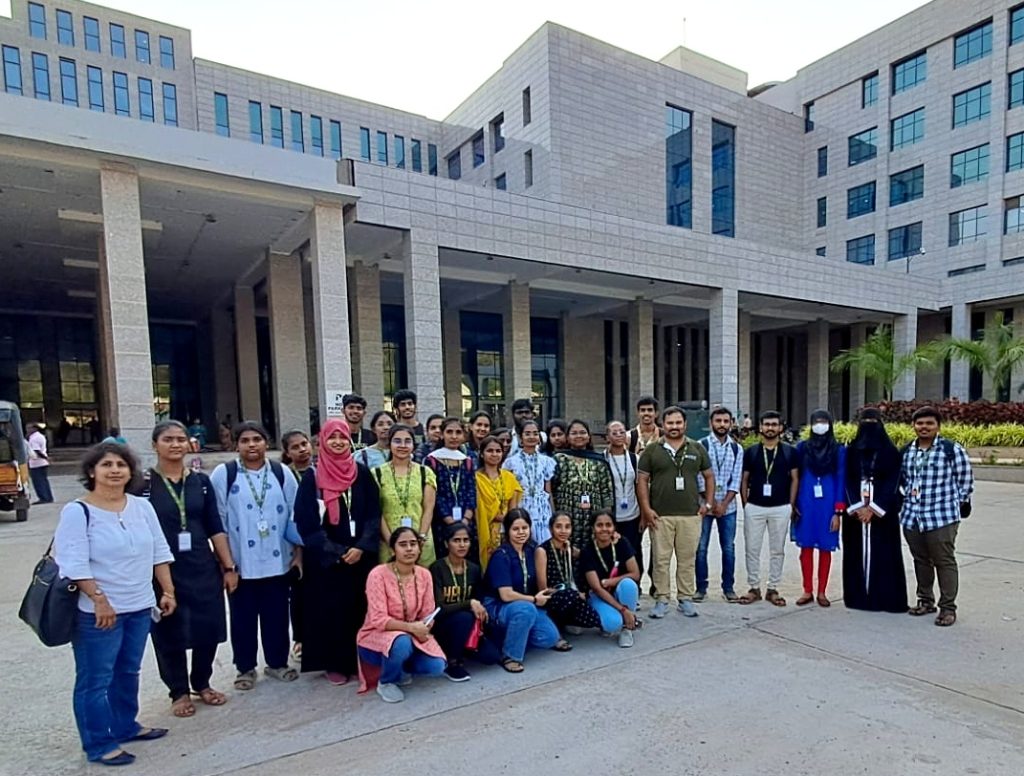
In a significant stride towards enriching their academic experience, students from the Department of Biological Sciences embarked on a captivating field trip to AIIMS Mangalagiri. This excursion served as an integral component of their Active Learning Process, fostering a deeper understanding of real-world applications in the realm of biology. The cohort comprised students from diverse academic backgrounds, including those pursuing 1st year B.Sc in Integrative Biology and M.Sc in Molecular Biology & Biotechnology. Their visit to AIIMS Mangalagiri provided them with a unique opportunity to gain firsthand insights into cutting-edge practices in the field of biomedicine.
During their visit, the students were granted exclusive access to the Integrated Stewardship and OPD Labs, where they were immersed in a world of advanced diagnostics and research methodologies. Expert lectures and demonstrations on state-of-the-art diagnostic techniques such as MALDI-TOF, CBNAAT, CLIA, Vitek, and BactAlert offered invaluable insights into the intricacies of disease detection and monitoring.
This excursion underscored the department’s commitment to fostering a culture of active learning and practical exposure among its students. By exposing them to prominent institutions and industries, such as AIIMS Mangalagiri, students were provided with hands-on training and the opportunity to engage with leading experts in the field.
Accompanying the students were esteemed faculty members of the department, including Dr Sutharsan Govindarajan, Dr Sudeshna Saha, and Dr Prateek Gupta, whose guidance and mentorship further enriched the learning experience.
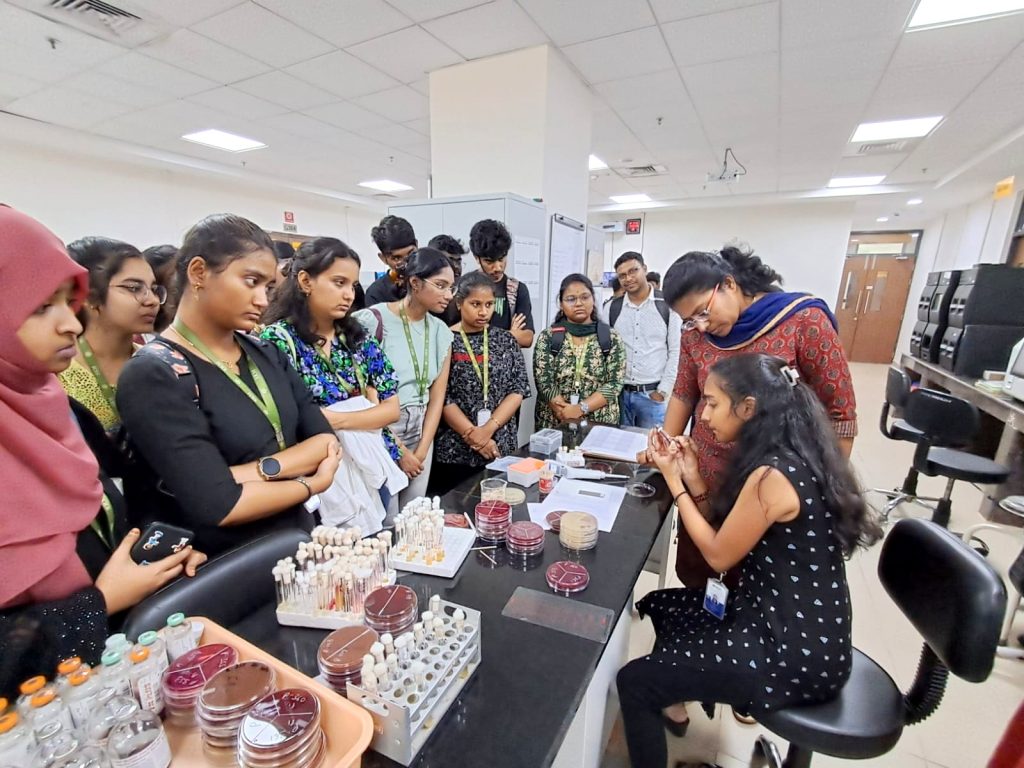
Furthermore, the collaborative efforts between the faculty of SRM University-AP and researchers at AIIMS Mangalagiri were highlighted during the visit. These collaborations span various domains, from developing biomedical devices for disease diagnosis to research endeavours in antimicrobial resistance (AMR), early cancer detection, and drug targeting. Such synergies between academia and research institutions present students with unparalleled opportunities to engage in impactful research initiatives and contribute meaningfully to the advancement of scientific knowledge
Overall, the field visit to AIIMS Mangalagiri served as a catalyst for academic excellence and professional growth, empowering students with the skills, knowledge, and networks necessary to thrive in the dynamic field of biological sciences.
- Published in Biology News, Departmental News, News
Unlocking Branding Insights with Mr Harish Bhardwaj
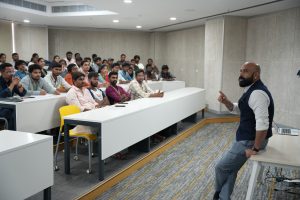 On March 20, 2024, MBA students at Paari School of Business had the privilege of attending an enlightening discourse on communication strategies for branding, delivered by the distinguished speaker, Mr Harish Bhardwaj. Throughout the session, Mr Harish emphasised the pivotal role of problem identification in effecting meaningful change.
On March 20, 2024, MBA students at Paari School of Business had the privilege of attending an enlightening discourse on communication strategies for branding, delivered by the distinguished speaker, Mr Harish Bhardwaj. Throughout the session, Mr Harish emphasised the pivotal role of problem identification in effecting meaningful change.
Mr Harish urged the students to adopt fresh perspectives and delve deep into issues, highlighting the importance of uncovering root causes. He asserted that solutions to complex problems often stem from simplicity. By encouraging students to think critically and analyse situations from different angles, he empowered them to approach branding challenges with innovative and effective strategies.
Furthermore, Mr Harish underscored the necessity of comprehending audience needs, stating, “It is not about what you have, but what they want.” He emphasised the power of active listening and genuine connections. By understanding the desires and preferences of the target audience, businesses can tailor their communication strategies to effectively engage and resonate with their customers.
Engaging the students in stimulating discussions, Mr Harish explored various topics related to branding. He delved into personal branding, emphasizing the importance of cultivating a strong and authentic personal brand that aligns with one’s values and goals. He also discussed the concepts of the ‘moment of truth’ and the ‘zero moment of truth,’ highlighting the significance of making positive impressions during customer interactions and the influence of online research on consumer decision-making.
He challenged the attendees to dissociate physical attributes from personality traits, emphasizing that serving others transcends mere personality. By focusing on providing value and meeting customer needs, businesses can build long-lasting relationships and establish a strong brand presence.
The session culminated in the exploration of the transformative potential of storytelling. He exemplified how stories can catalyse change, foster connections, and leave indelible impressions on audiences. Through captivating narratives, he illustrated the power of storytelling in creating emotional connections and engaging customers on a deeper level.
The discourse left the students at Paari School of Business enlightened and inspired, equipped with valuable insights into effective communication strategies for driving branding change. Mr Harish’s expertise and engaging delivery style ensured an enriching experience that will undoubtedly resonate with attendees for years to come.
Paari School of Business is committed to providing its students with opportunities to learn from industry experts and gain practical knowledge. Such insightful sessions contribute to the holistic development of students and prepare them to excel in their future careers.
- Published in Departmental News, News, Paari Current Happenings, paari-guest-lectures
Creating History: A Chase to Mt. Everest!
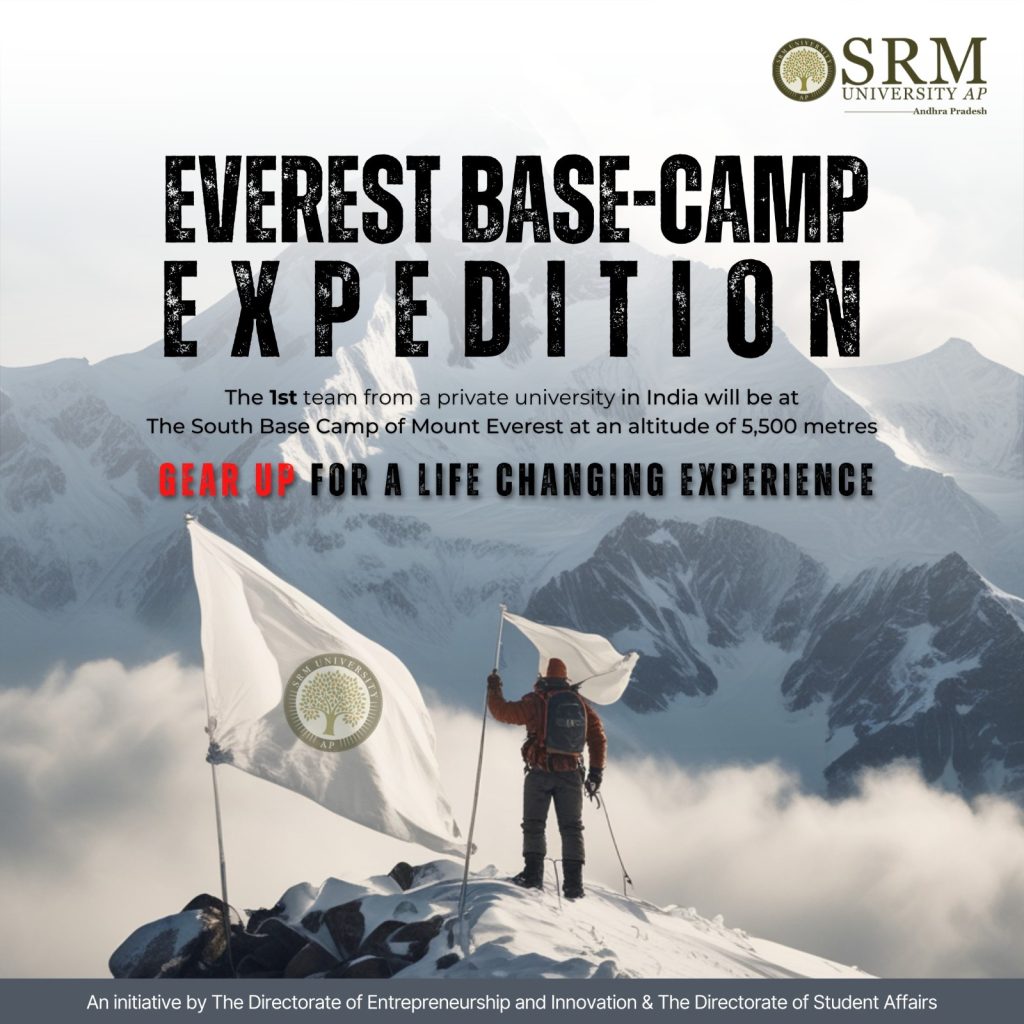
SRM University-AP is gearing up for the ultimate thrill-seeking escapade, which will have hearts racing and adrenaline pumping like never before! The Directorate of Entrepreneurship & Innovation and the Directorate of Student Affairs jointly organise the “Everest Base Camp Expedition”, the mother of all adventures – a daring conquest of the Earth’s highest mountain above sea level – Mount Everest!
The 15-day exhilarating journey will take flight with a maiden batch of 20 young adventurers selected through a rigorous physical and mental ability test on October 11, 2024 (tentative). 4 months of extensive training will commence in full swing, with the selected students pushing their limits and testing their endurance, moulding them into a complete voyager. Various training and practice trips have been scheduled to Arakku Valley to test their strength, Mangalagiri temple for elevation trekking training and much more.
This is a first-of-its-kind initiative by a university in India, presenting a unique opportunity for every enthusiastic explorer to witness the magnificence of the cold, icy peaks of the Himalayas. In addition to providing students with exemplary academic, research and entrepreneurial resources, SRM AP also emphasises the significance of 21st-century skills in nurturing them into socially aware and ethical citizens of tomorrow. This one-of-a-kind trip will ensure that students imbibe the value of belief and courage to instil purpose or a greater aim for anything that they might pursue in life, the importance of not losing faith during hard times and overcoming the obstacles that hinder your aim, the significance of camaraderie and teamwork, to develop essential leadership skills etc.
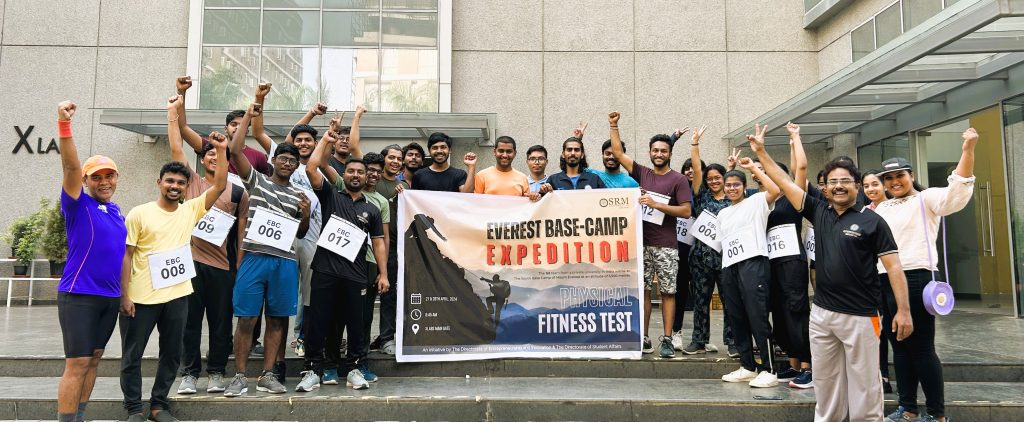
Students and their mentors have already begun their footsteps on a journey that will transform their lives! Embracing the thrill, embracing the adventure!
This journey will undoubtedly etch unforgettable memories into the fabric of their existence!
- Published in Departmental News, IDEA NEWS, News, student affairs news
Dr Pradyut and Students Revolutionise Disease Detection

In the groundbreaking research paper titled “Innovative Web Application Revolutionizing Disease Detection: Empowering Users and Ensuring Accurate Diagnoses,” Dr Pradyut Sanki, Associate Professor at the Department of Electronics and Communication Engineering, along with doctoral scholars Mr P N S B S V Prasad, and Mr Syed Ali Hussain and BTech students Ms Pragya Gupta and Ms Swikriti Khadke introduce a cutting-edge web application that aims to revolutionise disease detection and empower users to understand their health conditions.Their research paper published in the Journal of Electronic Materials has an impact factor of 2.1.
Abstract:
This paper presents an innovative enhancement aimed at revolutionizing disease detection and providing users with a reliable source of information for accurate diagnoses of their symptoms. Our open-source initiative combines a user-friendly interface design with advanced machine learning models, establishing a new benchmark for accuracy and enabling integration with even higher-performing models. We address the pervasive challenges of misinformation and misdiagnosis associated with online symptom searches, presenting a significant advancement in disease detection. Leveraging cutting-edge machine learning techniques.
Practical and Social Implications:
The practical implementation of our research means that people can use our smart tool to get better advice about their symptoms. This could lead to quicker and more accurate diagnoses, helping people get the right treatment sooner. Socially, our research could reduce the spread of false information online about health issues, leading to better-informed decisions and potentially improving overall public health.
Future Research Plans:
As a future research plan the students and faculty together plan to refine and expand their smart tool to make it even more accurate and helpful. They aim to incorporate feedback from users and collaborate with other experts to continually improve the technology. Additionally, they plan to explore ways to make the tool more accessible to a wider range of people and to address any potential biases in the data or algorithms. Overall, they are committed to advancing healthcare technology for the benefit of society.
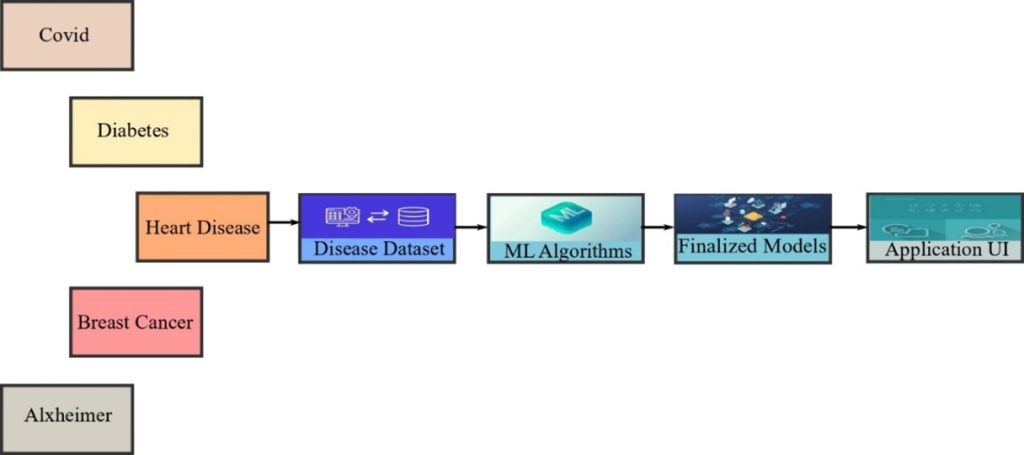
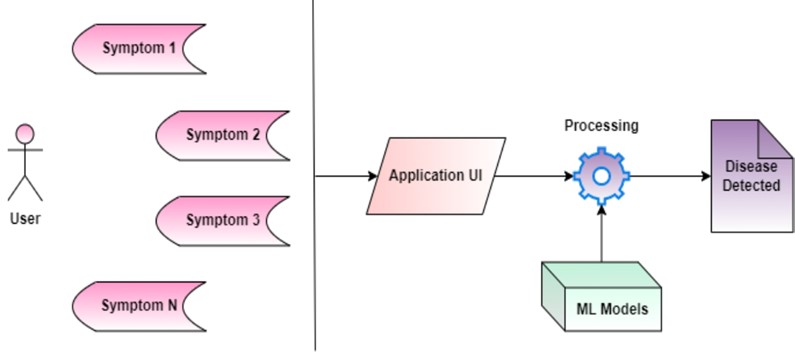
- Published in Departmental News, ECE NEWS, News, Research News
SRM AP Researchers Publish Groundbreaking Paper on DC Microgrid Integration
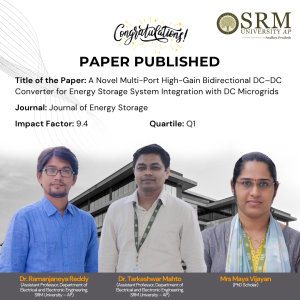 In a significant stride towards sustainable energy solutions, a team of researchers from the Department of Electrical and Electronic Engineering has unveiled a groundbreaking innovation. Their paper titled “A Novel Multi-Port High-Gain Bidirectional DC–DC Converter for Energy Storage System Integration with DC Microgrids” has been accepted in the prestigious Q1 Journal of Energy Storage, boasting an impressive impact factor of 9.4. The study focuses on addressing the critical challenges associated with energy storage systems (ESS) in direct current (DC) microgrids. Dr Ramanjaneya Reddy, Assistant Professor, Dr Tarkeshwar Mahto, Assistant Professor, and Mrs Maya Vijayan, a dedicated PhD Scholar, collaborated to design a multi-port high-gain bidirectional DC-DC converter. This innovative converter facilitates seamless integration of energy storage systems with DC microgrids, enhancing overall system efficiency and reliability.
In a significant stride towards sustainable energy solutions, a team of researchers from the Department of Electrical and Electronic Engineering has unveiled a groundbreaking innovation. Their paper titled “A Novel Multi-Port High-Gain Bidirectional DC–DC Converter for Energy Storage System Integration with DC Microgrids” has been accepted in the prestigious Q1 Journal of Energy Storage, boasting an impressive impact factor of 9.4. The study focuses on addressing the critical challenges associated with energy storage systems (ESS) in direct current (DC) microgrids. Dr Ramanjaneya Reddy, Assistant Professor, Dr Tarkeshwar Mahto, Assistant Professor, and Mrs Maya Vijayan, a dedicated PhD Scholar, collaborated to design a multi-port high-gain bidirectional DC-DC converter. This innovative converter facilitates seamless integration of energy storage systems with DC microgrids, enhancing overall system efficiency and reliability.
Abstract
Bidirectional converters have often been used in numerous applications like DC microgrids, renewable energy, hybrid energy storage systems, electric vehicles, etc. The paper proposes a novel multi-port high-gain (NMPHG) bidirectional DC-DC converter that supports DC microgrid (DC-MG) applications. The main contributions of the proposed converter are high step-up/step-down conversion gain, multiple input ports, lower switch voltage stress, and lower component count owing to the single converter with multiple input ports for DC microgrid applications.
The detailed operational principle, analysis, and design considerations of proposed NMPHG bidirectional DC-DC converters are discussed. Furthermore, the loss analysis, detailed comparison with similar works, and efficiency analysis with non-modalities during forward power flow (LV to HV) and reverse power flow (HV to LV) modes are presented. The efficiency of the proposed converter is found to be 93.8% in forward power flow and 92.9% in reverse power flow modes at rated power. Finally, a hardware prototype of the proposed NMPHG bidirectional DC-DC converter is implemented with 100 W in FPF mode and 200 W in RPF mode with a TMS320F28335 processor and validated with theoretical counterparts.
Explanation of Research in Layperson’s Terms
The proposed converter is a 200W bidirectional topology used in DC microgrid applications such as renewable energy, hybrid energy storage systems, and electric vehicles. The converter can accept two or more sources to supply the load. Thus, it is suitable for various applications of traction vehicles. It exhibits a lower switch stress and reduces the component ratings to lower values.
Title of Research Paper in the Citation Format
A NOVEL MULTI-PORT HIGH-GAIN BIDIRECTIONAL DC-DC CONVERTER FOR ENERGY STORAGE SYSTEM INTEGRATION WITH DC MICROGRIDS
Vijayan, Maya, Ramanjaneya Reddy Udumula, Tarkeshwar Mahto, and Ravi Eswar KM. “A novel multi-port high-gain bidirectional DC-DC converter for energy storage system integration with DC microgrids.” Journal of Energy Storage 87 (2024): 111431.
Practical Implementation or the Social Implications Associated with it
The features include port expandability on the source side, lower switch voltage stress, bidirectional property, and fewer components. It is most suitable for electric vehicles, Unmanned ariel vehicles, and energy storage systems at renewable power plants, etc. It improves the reliability of the grid system whereas hybrid energy storage systems with battery or supercapacitor will improve system stability.
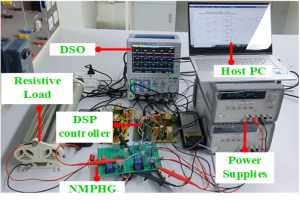
It can be used in various on-grid and off-grid applications like hospitals, offices, and educational institutions, especially where energy backup is very important. These types of converters are more specific for use in fast power transition required such as EVs, drones, aircraft, space vehicles, etc. The major advantage is the reduction in the size of the converter due to multiple source capability and ease of control.
Future Research Plans
We plan to work on a bidirectional converter with better efficiency and ultra-high gain. That should be able to reduce the size of the converter and the source ratings too. Design and implement bidirectional multi-port converters for various applications of DC microgrids, such as renewable and hybrid storage integration.
- Published in Departmental News, EEE NEWS, News, Research News
A Study on Self-Learning Controller Design for DC-DC Power Converters
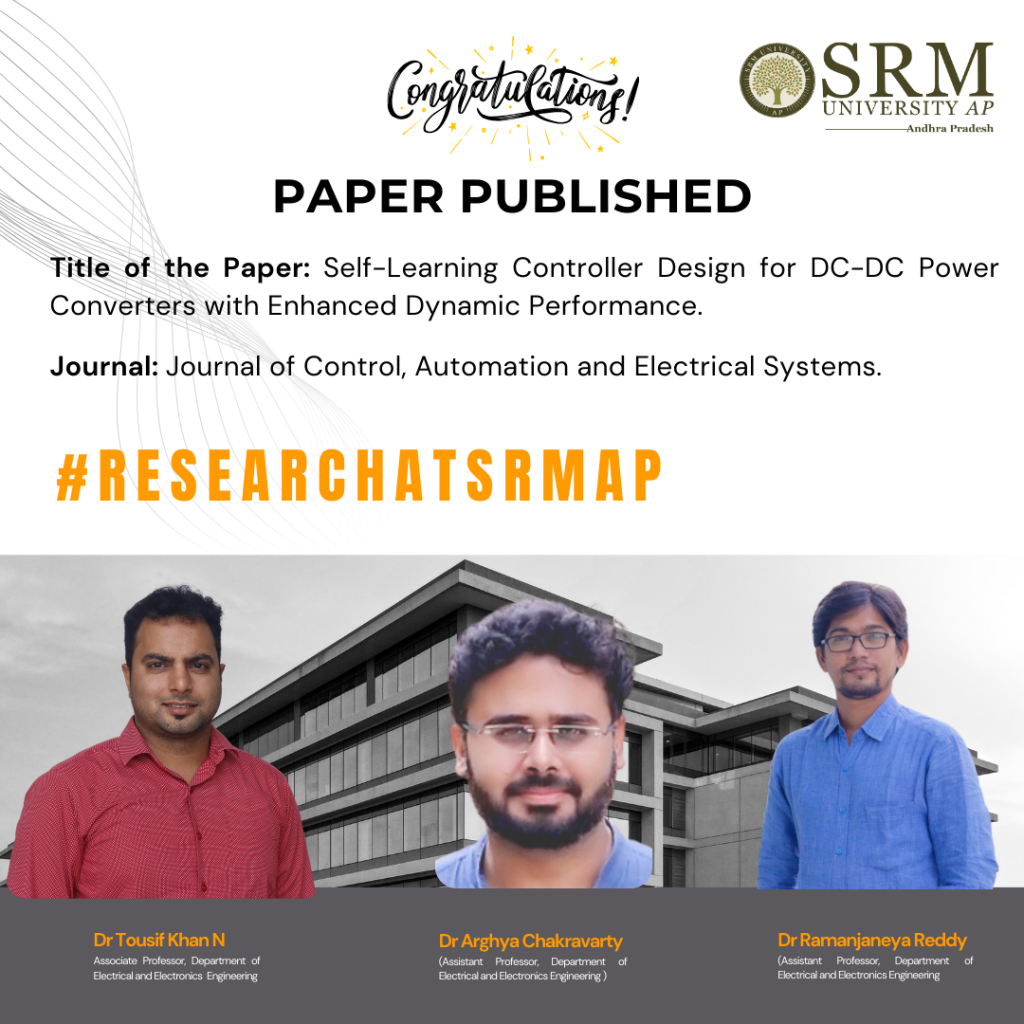
It is with great pleasure that we announce the publication of a research paper titled “Self-Learning Controller Design for DC-DC Power Converters with Enhanced Dynamic Performance,” jointly authored by Dr Tousif Khan N, Associate Professor, Department of Electrical and Electronics Engineering, and Dr Ramanjaneya Reddy & Dr Arghya Chakravarty, Assistant Professors, Department of Electrical and Electronics Engineering. The research paper introduces a novel self-learning control for precise output voltage tracking in DC-DC buck power converters.
Abstract:
This article introduces a self-learning robust control approach for accurate output voltage tracking in DC-DC buck power converters, focusing on scenarios with high precision requirements and significant load uncertainties. The method employs a simple online neural network to swiftly estimate unexpected load changes and disturbances across a wide range. Operating within a backstepping framework, the controller utilises neural network-learned uncertainties to enhance stability and improve dynamic and steady-state performance of both output voltage and inductor current. Extensive numerical simulations and practical experiments on a laboratory prototype demonstrate substantial enhancements in dynamic performance with a 94% reduction in settling time and precise steady-state tracking. The reliability of the proposed controller is further supported by the consistency between computational and experimental outcomes, showcasing its potential for real-world applications.
Practical implementations:
The proposed controller can be implemented/used for robotics applications, industrial processes, and medical equipment where precise control is needed.
Future research plans:
The following are the potential future directions of the proposed work;
(i) Design and development of the proposed self-learning neural network-based control for DC-DC buck converter systems with real-time DC sources, such as solar PV and fuel cells, experiencing highly intermittent input voltage changes.
(ii) Incorporating inductor current constraints and output voltage limitations into the proposed controller would also be an avenue worth exploring.
We congratulate the professors for their valuable contribution and look forward to future breakthroughs in this area.
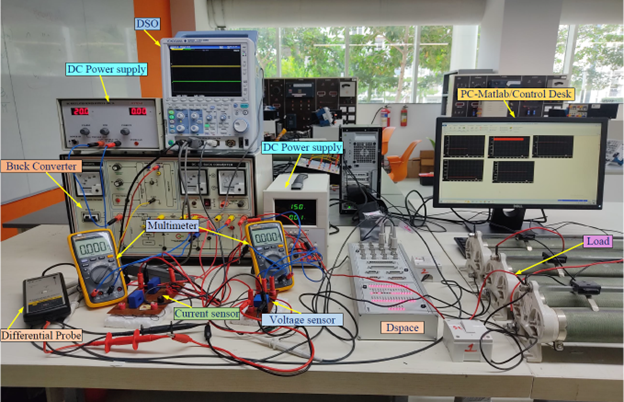
- Published in Departmental News, EEE NEWS, News, Research News
Unveiling Findings on Thermo-Mechanical Behaviour of FGM Sandwich Plates
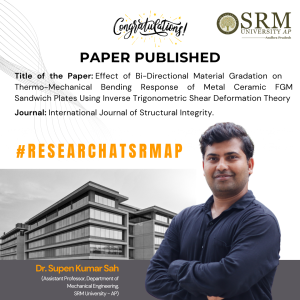 In a significant advancement in the field of material engineering, Dr Supen Kumar Sah, an esteemed Assistant Professor from the Department of Mechanical Engineering, has published a groundbreaking research paper.
In a significant advancement in the field of material engineering, Dr Supen Kumar Sah, an esteemed Assistant Professor from the Department of Mechanical Engineering, has published a groundbreaking research paper.
The study, titled “Effect of Bi-Directional Material Gradation on Thermo-Mechanical Bending Response of Metal Ceramic FGM Sandwich Plates Using Inverse Trigonometric Shear Deformation Theory,” appears in the prestigious International Journal of Structural Integrity.
Dr Sah’s research provides new insights into the behaviour of Functionally Graded Materials (FGMs) under thermal and mechanical loads, which is crucial for the design of advanced engineering structures. His work employs an innovative inverse trigonometric shear deformation theory to analyse the bending response of metal-ceramic FGM sandwich plates, offering a more accurate prediction of their performance in real-world applications.
This publication not only highlights the cutting-edge research being conducted at SRM University but also positions Dr Sah as a leading figure in the application of FGMs in structural engineering. The findings from this paper have the potential to influence the design and optimization of materials used in various industries, from aerospace to automotive.
Abstract
The purpose of this study is to investigate the bending analysis of metal (Ti-6Al-4V) ceramic (ZrO_2) functionally graded material (FGM) sandwich plate having material property gradation along length and thickness direction under thermo-mechanical loading using inverse trigonometric shear deformation theory (ITSDT). Mechanical and thermal properties of BDFGM sandwich plates are considered temperature-dependent in the present study. Analytical solution for bending analysis of FGM plate has been carried out using Hamilton’s principle and Navier’s solution.
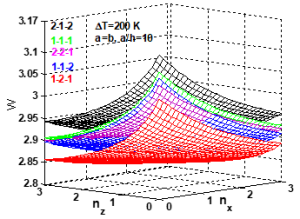

The present study shows that centre deflection, normal stress, and shear stress are significantly influenced by temperature-dependent material properties, bi-directional gradation exponents’ geometrical parameters, sandwich plate layer thickness, etc.
Title of the Research Paper in the Citation Format
Sah, S. K., Ghosh, A. (2024). Effect of Bi-Directional Material Gradation on Thermo-Mechanical Bending Response of Metal Ceramic FGM Sandwich Plates Using Inverse Trigonometric Shear Deformation Theory. International Journal Structural Integrity. DOI: 10.1108/IJSI-02-2024-0016
Collaborations
Prof Anup Ghosh, Indian Institute of Technology Kharagpur, India
Future Research Plans
Modelling and Analysis of porous uni and multi-directional Functionally Graded Material (FGM) plates to obtain the impact of porosity distributions over structural responses.
Analytical & Finite Element Solution for static and dynamic response of FGM sandwich plates employing non-polynomial shear deformation theories under elastic foundation.
- Published in Departmental News, Mechanical Engineering NEWS, News, Research News
Advancing Knowledge: Publication of Groundbreaking Research Paper
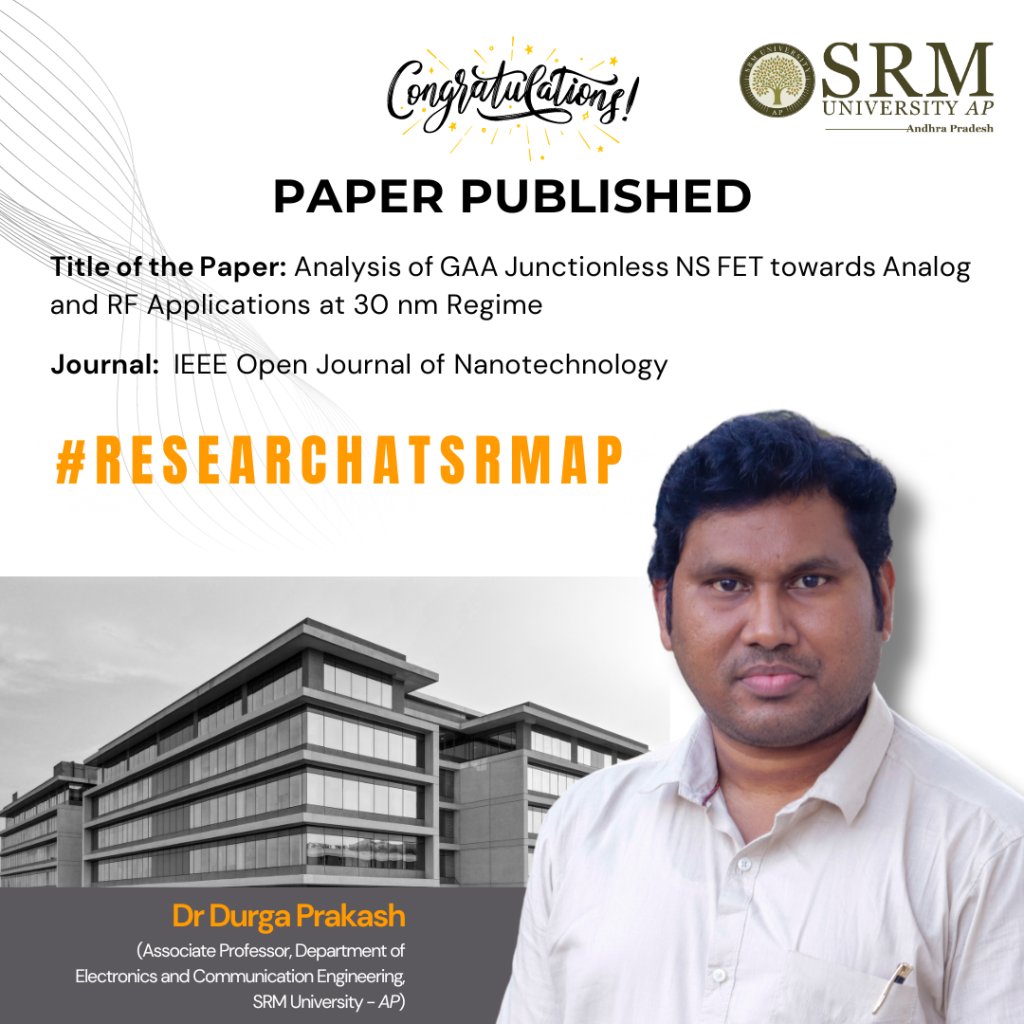
It is a matter of immense pleasure for the Department of Electronics and Communication Engineering to announce the publication of Dr Duga Prakash, Associate Professor at SRM University-AP. His research paper titled “Analysis of GAA Junctionless NS FET towards Analog and RF Applications at 30 nm Regime”, published in IEEE Open Journal of Nanotechnology, studies how the device can be manufactured with ease and minimal doping, eliminating the need for high-temperature doping processes. The enhanced performance metrics suggest that the device’s potential for faster analog/RF switching circuits paves the way for more efficient analog and RF applications at the 30 nm scale.
Abstract:
A new nanosheet FET is used to generate a quantum model in this research. A Gate-all-around (GAA) Junction-less (JL) nanosheet device with a 1 nm gate dielectric of SiO2 and HfO2 performs according to the standard model. The visual TCAD tool examines ION, IOFF, ION/ IOFF, threshold voltage, DIBL, gain parameters (gm, gd, Av), gate capacitance, and cut-off frequency to evaluate the classical and quantum models of the GAA nanosheet device. Simulation results show that the device’s low gate capacitance of 10–18 makes it suitable for rapid switching applications. Device research reveals a transconductance (gm) value of 21 μS and a remarkable cut-off frequency of 9.03 GHz. Its P-type device response has also been extensively studied. Finally, the inverter model uses the proposed GAA nanosheet device. Despite having larger gate capacitance, the NSFET-based inverter offers the smallest propagation delay helps apply knowledge to real-world situations.



- Published in Departmental News, ECE NEWS, News, Research News
Exploring Contemporary Narratives in New Media
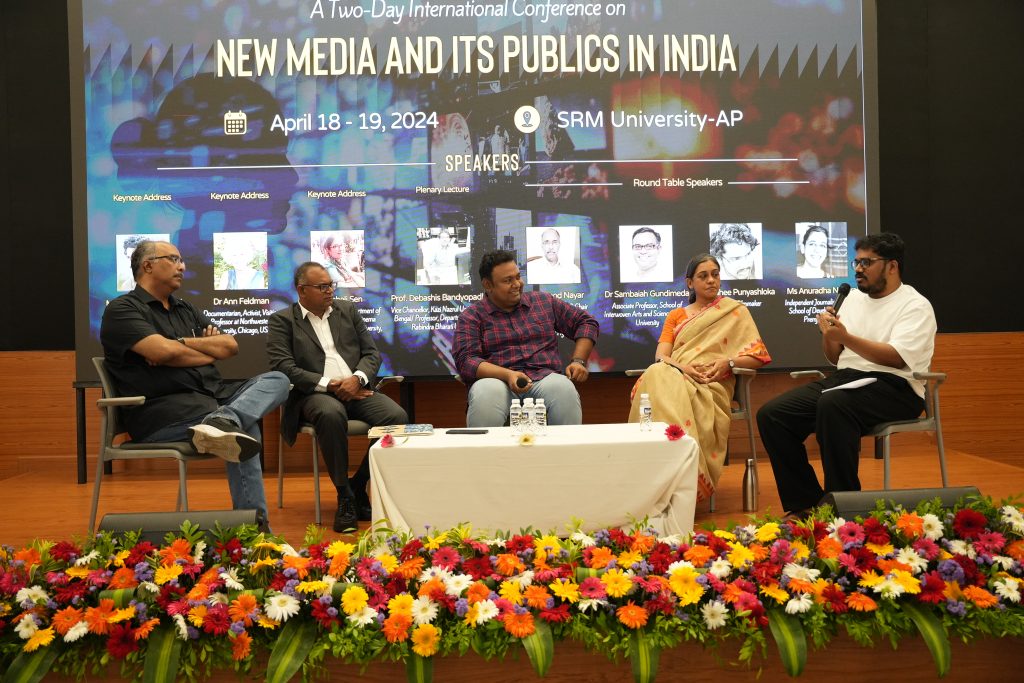
Department of Liberal Arts and the Department of Media Studies, under the aegis of the Easwari School of Liberal Arts at SRM University-AP organised its 2-day International Conference on New Media and its Publics in India. This prestigious conference welcomed renowned figures, including Mr Abhinandan Sekhri, co-founder and CEO of Newslaundry; Dr Ann Feldman, Documentarian and Activist; Dr Meheli Sen, Associate Professor, Department of AMESALL, Director of Cinema Studies Program, Rutgers University; Dr Pramod K Nayar, Professor and UNESCO Chair in Vulnerability Studies, Department of English, University of Hyderabad; Dr Sambaiah Gundimeda, Associate Professor, School of Interwoven Arts and Sciences, KREA University; Mr Rahee Punyashloka, Artist and Filmmaker and Ms Anuradha Nagaraj, Independent Journalist, Faculty at School of Development, Azim Premji University.
In his inaugural address, Vice Chancellor Prof. Manoj K Arora remarked, “We are honoured to host a conference of this magnitude. Media has become an indispensable facet of our contemporary existence; invariably, we all engage with or subscribe to media in some capacity.” Keynote speaker and co-founder of Newslaundry, Mr Abhinandan Sekhri, imparted his wisdom to the attendees, emphasising, “As the fourth pillar, media plays a pivotal role in society. It is imperative that we discern and uphold the principles of authentic journalism.” Prof. Vishnupad, Dean-Easwari School of Liberal Arts, remarked,” Technology and media have become an essential aspect of our lives today, and they have drastically altered our perception of things.”
Dr Meheli Sen, Dr Ann Feldman, Dr Pramod Nayar, Dr Sambaiah Gundimeda, Mr Rahee Punyashloka, and Ms Anuradha Nagarajan all deliberated on the various possibilities and interpretations that the New media offers and thereby shapes the public narratives. The conference also comprised a series of parallel sessions that explored the multifaceted relationship between New Media and various disciplines. Topics discussed included New Media and Literature, Gender, History, Democracy and Performance. Members of the academia presented their research papers, fostering insightful discussions on the evolving landscape of New Media.
The two-day event witnessed 150+ entries from students, scholars and faculties from across the country and the world and provided a platform for intellectual exchange but also fostered a collaborative spirit among participants. The conference concluded with a plenary address by Dr Pramod Nayar, which served as a catalyst for innovative thinking in New Media. Registrar Dr R Premkumar, in his message, applauded the efforts of the convenors, Dr Asijit Dutta and co-convenors Dr Sapna Mishra and Dr Partha Bhattacharjee for organising a scholarly colloquium such as this and remarked, “the exchange of ideas, scholarly debates, and interdisciplinary discussions that transpired here will undoubtedly enrich the academic landscape and advancement in the field of new media”.
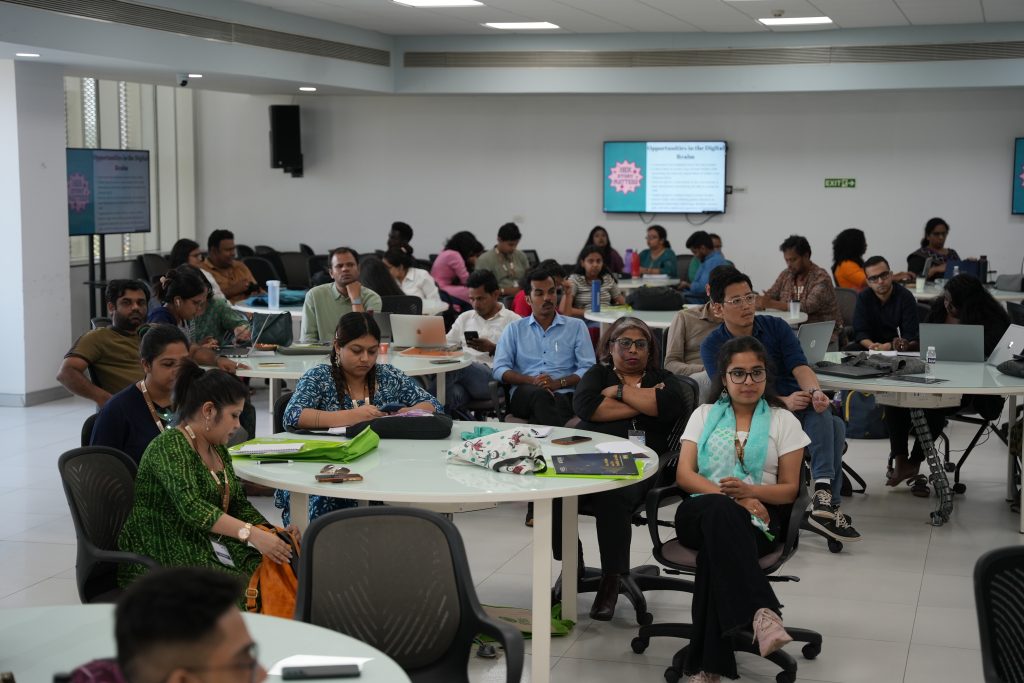
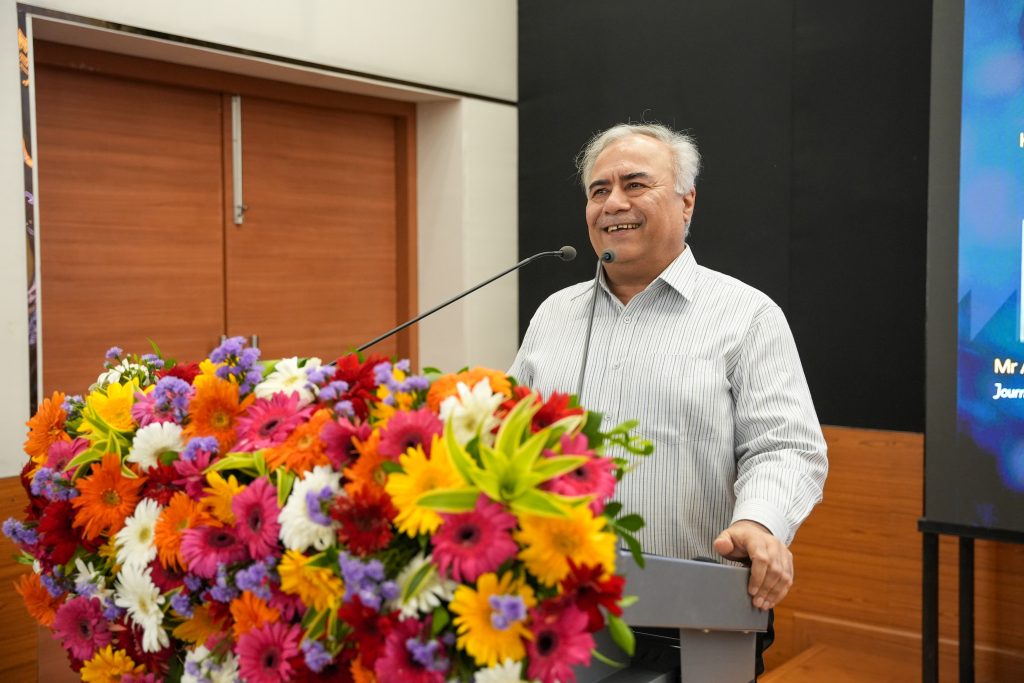
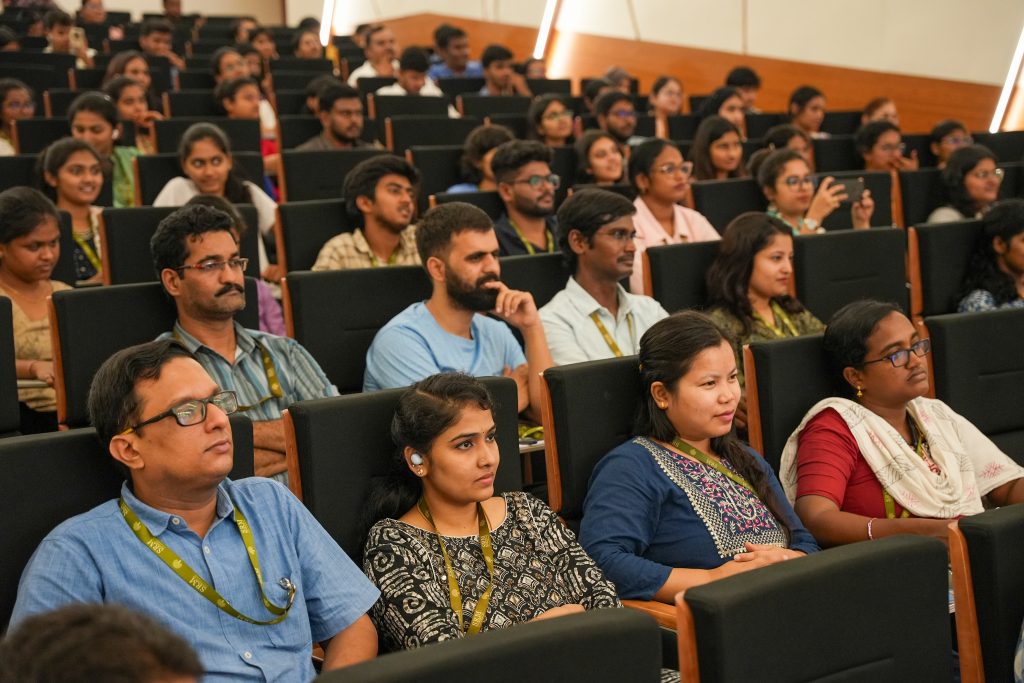
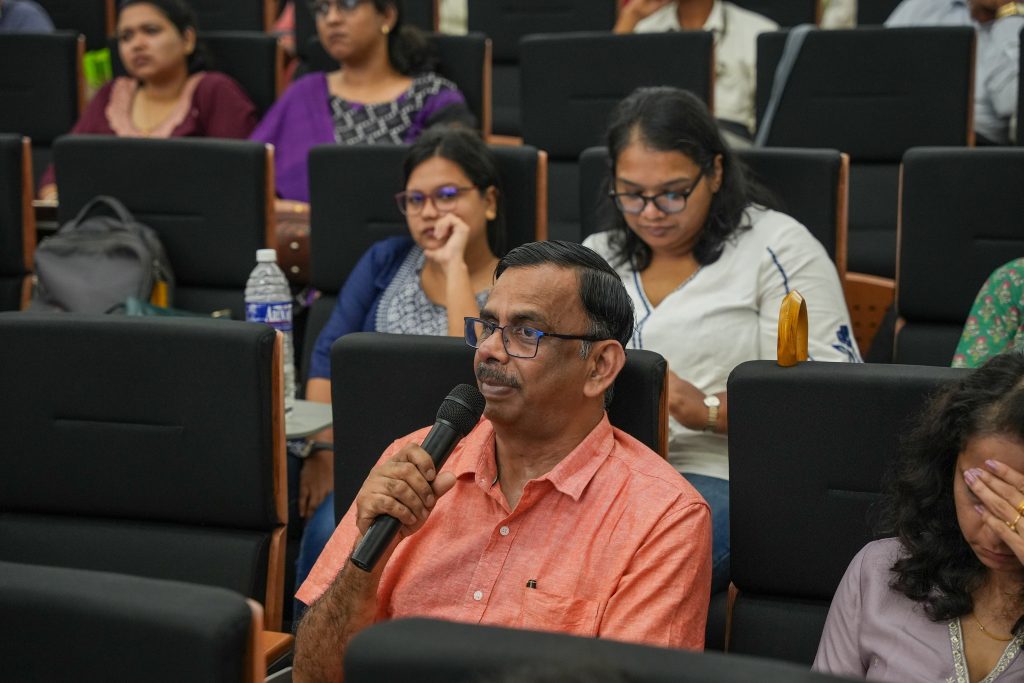
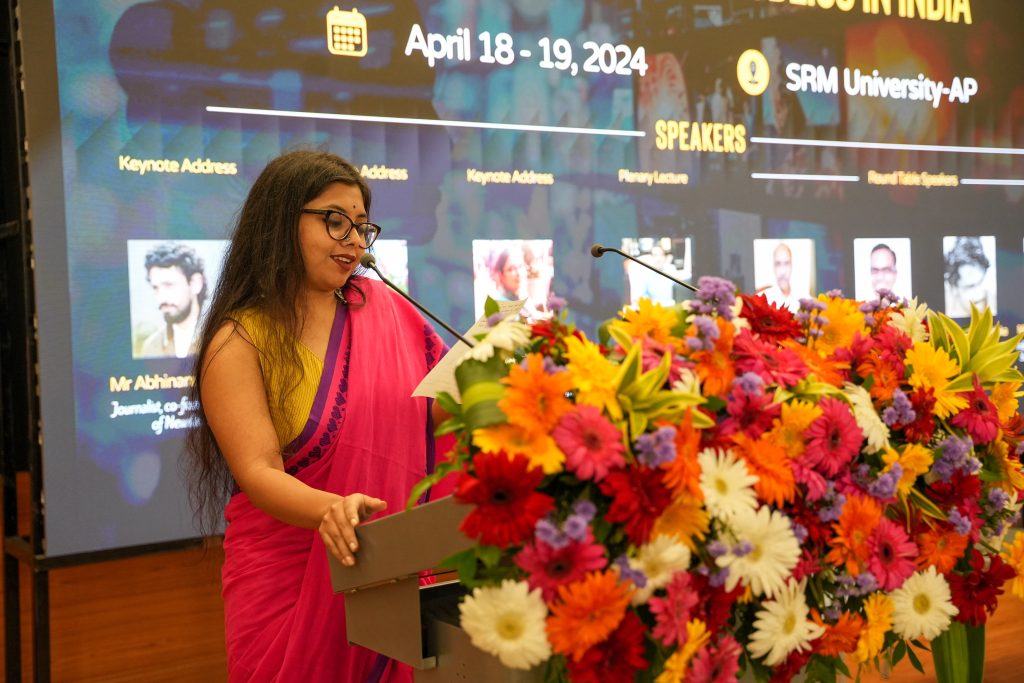
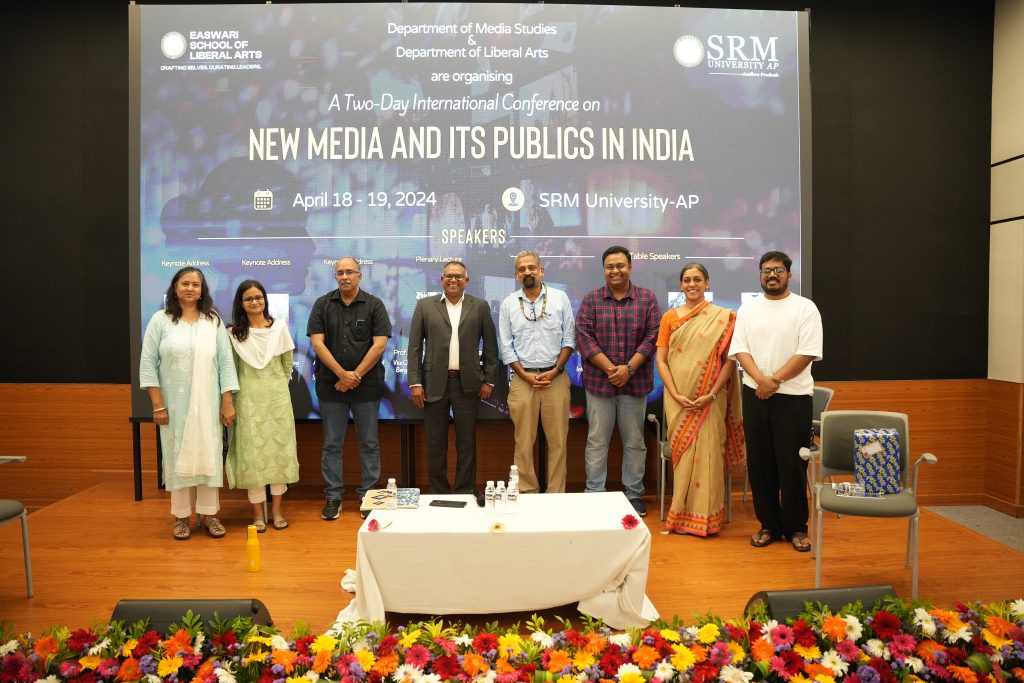
- Published in Departmental News, Liberal Arts News, Media Studies, News
Unveiling the Post-Pandemic Tapestry of Mind and Body in Türkiye
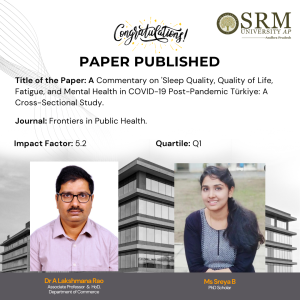 We are thrilled to announce that Dr A Lakshmana Rao, Associate Professor from the Department of Commerce along with Ms Sreya B, a distinguished PhD Scholar, have made a significant contribution to the field of public health with their latest publication.
We are thrilled to announce that Dr A Lakshmana Rao, Associate Professor from the Department of Commerce along with Ms Sreya B, a distinguished PhD Scholar, have made a significant contribution to the field of public health with their latest publication.
Their paper, titled “A Commentary on ‘Sleep Quality, Quality of Life, Fatigue, and Mental Health in COVID-19 post-pandemic Türkiye: A Cross-Sectional Study’,” has been published in the esteemed journal Frontiers in Public Health, which boasts an impressive impact factor of 5.2.
This groundbreaking study delves into the crucial aspects of sleep quality, quality of life, fatigue, and mental health in the aftermath of the COVID-19 pandemic in Türkiye. The research provides insightful commentary and analysis, contributing valuable knowledge to our understanding of the pandemic’s long-term effects on human well-being.
The SRM University-AP community is proud of Dr Rao and Ms Sreya B for their dedication and excellence in research. Their work not only enhances the reputation of our institution but also serves as an inspiration for our students and faculty alike.
We congratulate them on their achievement and encourage our readers to access the full paper to learn more about the study’s findings and implications for public health.
Abstract
This commentary examines the impact of the COVID-19 pandemic on mental health and sleep quality among the Turkish population, focusing on socio-demographic disparities and gender-based differences. To investigate the lasting effects of the pandemic, a comprehensive cross-sectional, multi-center-based survey was conducted in 2022. The study used robust sampling strategies and validated assessment tools such as WHOQOL-BREF, PHQ-15, DASS-21, GAD-7, PSQI, and FAS to reveal significant associations between poor sleep quality and worsened mental health.
The findings highlight the need for targeted interventions post-pandemic. The study conducted a detailed analysis, including multivariate regression, to explore the interaction between socio-demographic factors, mental health, and sleep quality, providing valuable insights for future public health interventions that consider both socio-demographic characteristics and lifestyle factors. In conclusion, the study advocates prioritising interventions that enhance sleep quality as a crucial aspect of post-pandemic public health, offering potential avenues for mitigating mental health disorders. Despite acknowledged limitations, the research’s contributions to understanding post-pandemic mental health challenges underscore its relevance in shaping targeted public health interventions.
Explanation of the Research in Layperson’s Terms
This article discusses a research study conducted in Turkey to investigate the impact of the COVID-19 pandemic on people’s sleep, quality of life, fatigue, and mental health. The study discovered that numerous individuals experienced sleep problems and mental health disorders following the pandemic, likely due to stress and social isolation. It suggests that enhancing sleep quality could help to improve mental health in the future, emphasising the significance of addressing these issues in public health strategies.
Title of Research Paper in the Citation Format
Sreya B, Lakshmana Rao A, (2024) Commentary: Sleep quality, quality of life, fatigue, and mental health in COVID-19 post-pandemic Türkiye: a cross-sectional study. Front. Public Health 12:1393054. Doi: 10.3389/fpubh.2024.1393054
Practical Implementation or the Social Implications Associated with the Research
The findings of the research have significant practical and social implications for addressing the impact of the COVID-19 pandemic on the Turkish population. The study underscores the importance of targeted interventions aimed at improving sleep quality to mitigate long-term mental health challenges. These interventions might involve stress management programs, education on sleep hygiene, and increased access to mental health services. Furthermore, optimising healthcare resource allocation by prioritising mental health services and sleep disorder clinics could enhance support for individuals struggling with mental health issues.
Public health campaigns focusing on the importance of sleep for mental well-being could raise awareness and promote strategies for improving sleep quality across various demographic groups. Additionally, the research helps reduce stigma around mental health by highlighting the prevalence of mental health symptoms and sleep disturbances post-pandemic, encouraging more individuals to seek support without fear of judgment. Moreover, recognising the impact of social isolation on mental health and sleep quality underscores the importance of fostering social support networks and community connections to aid in post-pandemic recovery.
Policy development informed by the research findings could address broader social determinants of health, such as housing insecurity and access to healthcare, to create a more supportive environment for mental health and sleep quality improvement initiatives. Overall, integrating mental health and sleep quality considerations into post-pandemic recovery efforts is crucial for promoting the overall well-being of the Turkish population.
- Published in Commerce Current Happenings, Departmental News, News, Research News


